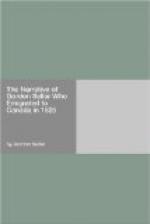It was shower and shine all day. I footed on my way as fast as I could, for the cut was still tender. Towards night I neared a little village and saw an old man sitting on the doorstep reading. I asked him if I was on the right road to Dundonald. He replied I was, but it was too far away to reach before dark, and he put a few questions to me. Asking me to sit beside him we had a talk. Did you ever see that book? holding out the one he was reading. ’It is A Cloud of Witnesses, and gives the story of the days of persecution. I wish every man in Scotland knew what it contains, for there would be more of the right stuff among us. I was just reading, for the hundredth time, I suppose, the trial of Marion Harvie, and how he who was afterwards James King of England consented to send her, a poor frail woman, to the gallows’. From the Covenanters he passed to politics. He was a weaver and did not like the government, telling me, seeing where I came from, I must grow up to be a Glasgow radical. Seeing I was homeless, he said he would fend me for the night, and, going into the house, he brought out a coggie of milk and a barley scone. When I had finished, he took me to the byre and left me in a stall of straw, telling me to leave early for his wife hated gangrel bodies and would not, when she came in, rest content, if she knew there was anybody in the stable. When daylight came it was raining. I started without anybody seeing me from the house. I was soon wet to the skin, but I trudged on, saying to myself every now and then You’re a Scotchman, never say die. There were few on the road, and when I met a postman and asked how far I was from Dundonald, his curt reply was, You are in it. I was dripping wet and oh so perished with cold and hunger that I made up my mind to stop at the first house I came to. As it happened, it was a farm-house a little bit from the road. I went to the kitchen-door where there was a hen trying to keep her chicks out of the rain. There were voices of children at play and of a woman as if crooning a babe to sleep. I stood a while before I ventured to knock. There was no answer and after waiting a few minutes I knocked again. A boy of my own age opened the door. An old woman came towards me and asked what I wanted. I am cold, I said, and, please, might I warm myself? She was deaf and did not catch what I said. ’Whose bairn are you?’ she asked me. Mary Askew’s, I replied, I noticed the younger woman who had the child in her lap fixed her gaze on me. Where are you from? grannie asked. From Glasgow and I am so cold. Laying down the child in the cradle, the younger woman came to me and sitting on a stool took my hands. ‘Where did your mother belong?’ she asked in a kind voice. She came from the parish of Dundonald. ‘And where is your father?’ He is dead. ‘And is your mother in Glasgow?’ She died in the hospital, and the thought of that sad time set the tears running down my cheeks. ’You poor motherless bairn!’




